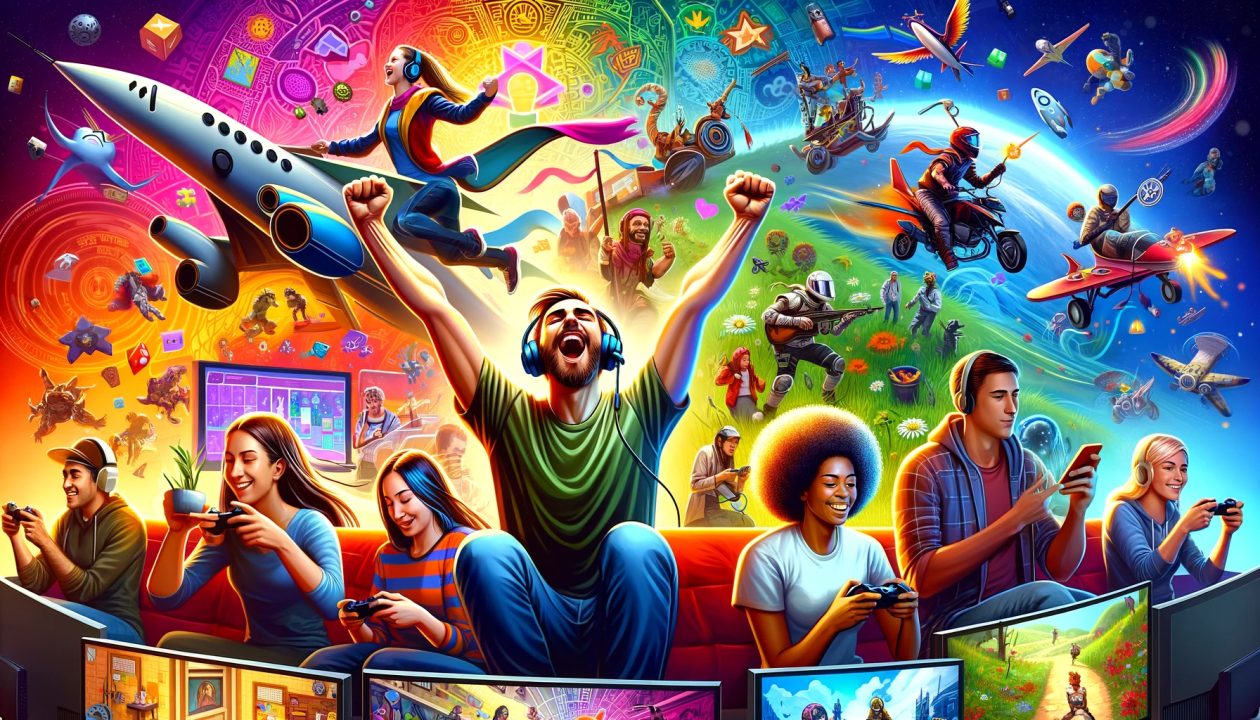Introduction
Video games have come a long way since the days of pixelated graphics and simple joystick controllers. What was once seen as a niche hobby has blossomed into a multi-billion-dollar global industry that influences not just entertainment, but culture, education, and even social connections. Whether you’re a casual player or a hardcore gamer, the world of video games has something to offer everyone. This article explores how video games have evolved, their impact on society, and what the future holds for this exciting medium.
The Evolution of Video Games
The journey of video games began in the late 20th century, with iconic systems like the Atari 2600, Nintendo Entertainment System (NES), and Sega Genesis paving the way. Games were simpler back then, often centered around basic mechanics and 8-bit graphics. However, advancements in technology, storytelling, and graphics have transformed the gaming world into a visually immersive and highly interactive experience.
Today, we see realistic graphics, expansive open-world environments, and intricate narratives that rival those of Hollywood blockbusters. Titles like The Witcher 3, Red Dead Redemption 2, and Cyberpunk 2077 offer players rich worlds and deep storylines that captivate both casual players and hardcore gamers alike.
Gaming as a Form of Entertainment
While movies and television remain staples of entertainment, gaming offers something truly unique: the ability to actively engage with the story. Unlike passive viewing, video games place the player in control, allowing them to shape the narrative, influence outcomes, and explore different possibilities. This level of interactivity has made gaming a deeply immersive experience.
Popular genres include:
- Action/Adventure – The Legend of Zelda series, Tomb Raider
- Role-playing Games (RPGs) – Final Fantasy, The Elder Scrolls
- First-Person Shooters – Call of Duty, Halo
- Simulation – The Sims, SimCity
For many players, gaming isn’t just about fun—it’s a form of self-expression, social interaction, and a way to unwind after a long day.
The Social Side of Gaming
Gone are the days when video games were primarily a solitary experience. Today’s multiplayer games offer players the chance to connect with friends and strangers around the world. Whether it’s teaming up to defeat enemies in Fortnite or competing in League of Legends, gaming has created global communities.
The rise of esports has taken this to the next level, with competitive gaming tournaments attracting millions of viewers and offering players the opportunity to turn their passion into a career. Twitch and YouTube have become major platforms for streamers, allowing gamers to share their experiences, build audiences, and even make a living from playing games.
The Positive Impact of Gaming
Video games are often misunderstood as merely a form of entertainment, but research has shown that gaming can have several positive effects on mental and cognitive development. Here are a few benefits of gaming:
- Improved problem-solving skills: Many games require critical thinking, strategy, and planning.
- Enhanced creativity: Sandbox games like Minecraft allow players to build and create their own worlds.
- Increased social interaction: Online multiplayer games foster teamwork, communication, and collaboration.
- Stress relief: For many, gaming is an enjoyable way to relax and temporarily escape from daily stress.
The Future of Gaming
As technology continues to evolve, the future of gaming looks incredibly exciting. Virtual reality (VR) and augmented reality (AR) are set to change the way we play, offering fully immersive experiences that blur the line between the real world and the virtual one. Cloud gaming is another trend that allows players to stream games without needing powerful hardware, making high-quality gaming more accessible to a wider audience.
Emerging trends include:
- Subscription services like Xbox Game Pass and PlayStation Now, which offer access to a large library of games for a monthly fee.
- Cross-platform play, allowing players on different devices to connect and play together.
- AI-driven gameplay, where artificial intelligence adapts to a player’s style and preferences for a more personalized experience.
Conclusion
From humble beginnings to the forefront of entertainment, video games have earned their place as one of the most influential forms of media today. As technology advances, gaming will continue to push boundaries, offering new ways to engage, connect, and explore. Whether you’re a casual player or an esports enthusiast, the world of gaming has something exciting in store for everyone. So, grab your controller, dive into a new world, and level up your life!
